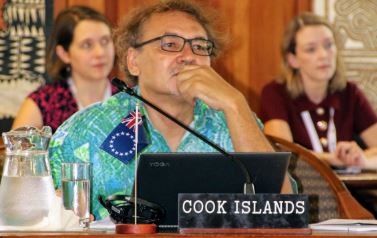Cook Islands chairing regional conference on sea level rise
Wednesday 29 March 2023 | Written by Supplied | Published in Environment, National

Cook Islands High Commissioner to Fiji Jim Armistead at an event in 2020. MFAI/23032817
Cook Islands High Commissioner to Fiji Jim Armistead is chairing a Pacific Islands Forum conference gathering of top global minds on international law in Fiji this week, putting the spotlight on sea level rise as it implicates statehood and persons.
Delegates who work with climate change, oceans, human rights, and the Law of the Sea are using the conference which started on Monday (Fiji time) to unpack complex questions for the future of the large ocean states of the blue continent.
In opening remarks to a regional conference on statehood and the protection of persons affected by sea level rise, Forum chair, Cook Islands Prime Minister Mark Brown highlighted the anxiety and questions facing island nations losing shorelines and water security to the rising tides.
“You are at the forefront of ground-breaking work that will influence a legacy for our children and future generations into perpetuity,” said PM Brown in a recorded opening presentation to the hybrid event.
Sovereignty, lands and homes, fundamental and universal rights and freedoms, and the status of states are questions that “are difficult but real- they require solutions,” he said.
“We are at a new frontier and the world once again looks to us to steer the way despite the problem and injustices being caused by others. This is our lived reality. This is our climate emergency.”
The four-day conference in Nadi, Fiji, is chaired by the High Commissioner of the Cook Islands to Fiji, Jim Armistead, supported by the Forum Secretary General Henry Puna, the former Cook Islands prime minister, and deputy secretary general, Dr Filimon Manoni, and attended by Pacific Islands Forum members including national, regional, and global officials, experts and diplomats working on the legal contexts of climate change impacts on ocean states.
In his opening, the Forum Chair described the 2021 Pacific Islands Forum Declaration on Preserving Maritime Zones in the Face of Climate Change Related Sea Level Rise (2021 PIF Declaration), as a ground-breaking benchmark and “an excellent starting point for this Conference”.
“We must continue to be meticulous, deliberate and patient to bring about real, progressive development of international law. We must also continue to enhance our active engagement with key bodies such as the International Law Commission and International Law Association.
“We must continue to leverage geopolitical interests and opportunities to advocate for and secure our legal rights and entitlements into perpetuity. Now, more than ever, our identity and advocacy are vital.”
Amongst other issues, the conference will look into next steps for the 2021 PIF Declaration, and the mandate from Leaders to recognise the impact of climate change of Pacific peoples and statehood.
In his welcome remarks, Puna noted “the gravity of the task put to us- the IPCC has recently released the Synthesis Report of its 6th Assessment Cycle, re-emphasising yet once again, the grim forecast on the effects that climate change, and sea-level rise, will have on our island states.”
He said the task for the conference would be to “collectively and courageously share our ideas, and skilfully weave a framework, that harnesses both a collective understanding, and innovative solutions, on a way forward for our region. We, on the front line of climate change, will inevitably pave the way on these complex issues.”
Puna urged continued focus on the efforts of the Pacific to “to keep global emissions below 1.5 degrees in accordance with the Paris Agreement. We must not lose sight of the bigger picture– climate change is an existential threat to our Pacific family and ensuring that we keep global temperatures below 1.5 degrees, must always remain a top priority for us.”




















































